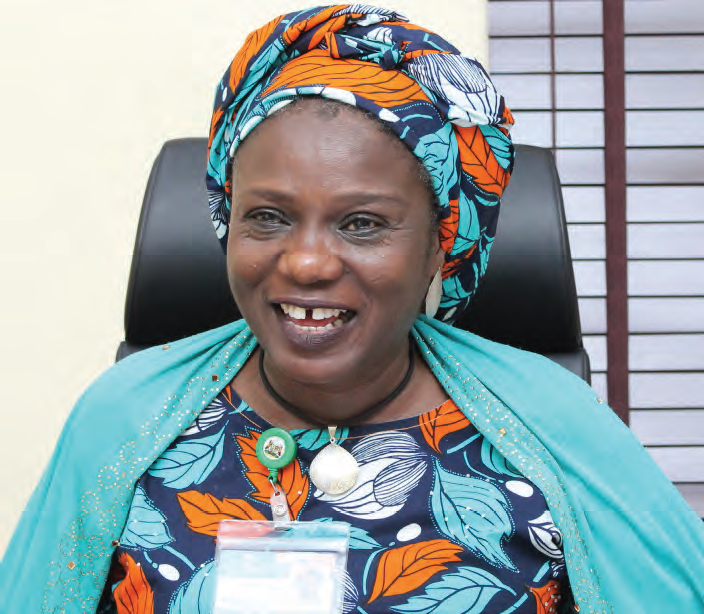FAUSAT IBIKUNLE, the Commissioner of Housing and Urban Development, is also the Chair of the Committee on Markets Decongestion, which was saddled with the responsibility of making traders to comply with Governor Nasir El-Rufai’s directive to check the spread of COVID-19. In this interview, she gave an interim assessment of the degree of compliance, a day after the directive was given.
What is the composition of the Committee that was constituted to enforce the compliance of Governor Nasir El-Rufai’s directive of the limited closure of markets, as a way of containing the spread of the Coronavirus?
Some few months back, a committee was inaugurated under my chairmanship as Commissioner for Housing and Urban Development. And the major task that we were given was to congest all markets, including linear markets, and try to sanitise Kaduna State as it were. That committee has been sitting and it comprises various Ministries Departments and Agencies that have the statutory mandate to perform this kind of assignment. Number one amongst them is Kaduna Markets Development and Management Company (KMDMC). Kaduna State Urban Planning and Development Authority (KASUPDA) is there. KASTLEA is also there. We also have security agencies like Nigerian Civil Defence. The committee has been meeting and we are still doing our work of decongesting markets, then this unfortunate disease came. So, our committee was then given the task to go ahead and enforce Government’s directive of ensuring that only traders that sell food items and medication should go to the markets, so as to check the spread of COVID 19.
So far, what has been the level of compliance to this directive?
For now, it is still now where we want it to be but it is already taking shape. I can say that over all, let me say compliance is between 45% to 50% across the state. The work of the committee is not limited to Kaduna town, it extends to Zaria, Kafanchan and other major towns across the state. But within Kaduna metropolis which has the bulk of the challenges, the compliance has been increasing. But at the periphery, we have some problems. In Kaduna South local government for example, we don’t have problems with the market but some of the large plazas that also host a lot of people, we are still having some challenges. We have just finished holding our meeting(on Wednesday) and we are re-strategising on how overcome the challenge. We also have a few markets specifically in Rigasa area. Although the markets sell food items, in compliance with the Governor’s directive, but they are too choked up with people and they present a problem. So, the dilemma we have is that, we said that we will allow essential commodities like food items to be sold in the market. But these markets also sell food items but they are too choked up as they are, not to talk of when people go there to buy things. So, we feel if we allow that kind of market to operate, it will put a lot of people at risk, should there be any circumstances that are beyond our control. So, we have directed a team to meet with the leadership of the markets and the leadership of the community, like the Hakimi and some officials of the local government. We will ask them to devise a way out or we will have to close the markets, in spite of the fact that it sells only food items. That is the only major challenge that we now have.
Have there been arrests of people who have refused to follow the directive?
No, we have not started making arrests. When we met yesterday (Tuesday), we resolved that since it was the first day after the directive was issued, we decided to do a lot of sensitisation, meeting the leadership of the markets, running jingles and messages. We have decided to continue with that for about two or three days while we go out and enforce. But the arrest will start as from today (Wednesday). We decided to embark on the sensitisation and enforcement before arrest because some people were claiming that they didn’t know of the directive or what constitutes essential commodities. They insist that what they were selling is essential; so we are spelling things out for them. At the meeting today, we also decided that we should do some stickers; so that we will place on defaulting shops or stalls. The markets are even easier to manage than plazas. So, even if our enforcement team is overwhelmed, we will call for reinforcement from the security committee to come to our aid in order to lock up shops. We padlocks, we chains.
Apart from enforcing the compliance on partial opening of markets, how are you enforcing the restriction of movement within Kaduna and travelling into the state?
Although KASTLEA is part of our committee, I’m aware that it is doing something about that. The details of what is being done is being handled by another committee. Definitely, I know that KASTLEA will brief us in the course of our assignment because they are part of our committee.
As at today, the Kaduna-Abuja train is still operating, in spite of the Governor’s clear directive. What is your committee doing about it?
I don’t think that that is part of this committee’s assignment. The information that we had was that pronouncement that the Governor will reach out to relevant authorities to suspend the services of the Abuja-Kaduna train as from Monday. I only just heard that they are still offering service. So, I don’t think that it is part of this committee’s assignment. It’s going to be handled at another level, unless we are asked to do something about it.
But this partial closure of markets has brought about panic buying of food stuff especially. Is this not piling to the tension that already exists as a result of COVID-19?
Well, I don’t want to use the word panic but I will also encourage people to stock up whatever they need to stock up. The situation that we are in now is not something that we can predict. A situation may arise, which we are not praying for, where we will be asked to just stay at home because I know it’s happening in other countries; like in Italy and some parts of the United Kingdom, it is a total lockdown. We don’t envisage that that will come but there is no way we can predict it. So, I will encourage people to gently stock up; not panicky, because panic can cause another wahala. But where people want to stock up, they should just stock up. I think it will be in everybody’s interest. When people stock up, it will reduce the number of people on the streets because they already have most of their needs at home, so they don’t need to come out much. So, this will help us to achieve limiting the number of people in the streets.
Governor Nasir El-Rufai had threatened that if the level of compliance to these safety measures is not satisfactory enough, the Government may be forced to impose a curfew. From your monitoring of the situation, do you think that we will reach that stage?
I hope we don’t get to that. We only started this exercise yesterday (on Tuesday). We are also monitoring to see what happens in the next two or three days. And it is in people’s interest to comply with the directive of the government. I agree with the Governor totally because if people fail to comply, and the language that people will understand it total lockdown or curfew, so be it. But we are trying our best and people are responding. There are so many areas that are making our work not too difficult.
Are you reaching out to religious leaders for them to tell their followers to worship at home on Friday and Sunday?
No, that’s not part of the mandate of this committee. We believe that the committee in charge will do that. Our own is to decongest the market and very busy commercial hubs that attract a large number of people; encourage people who are selling non essential commodities to close shop. Only those who are selling essentials like food items, things that have to do with baby care and pharmaceuticals are exempted. Others traders should just lock their shops in compliance to the directive of His Excellency. If they don’t we will force them to do so.

 Join Daily Trust WhatsApp Community For Quick Access To News and Happenings Around You.
Join Daily Trust WhatsApp Community For Quick Access To News and Happenings Around You.


